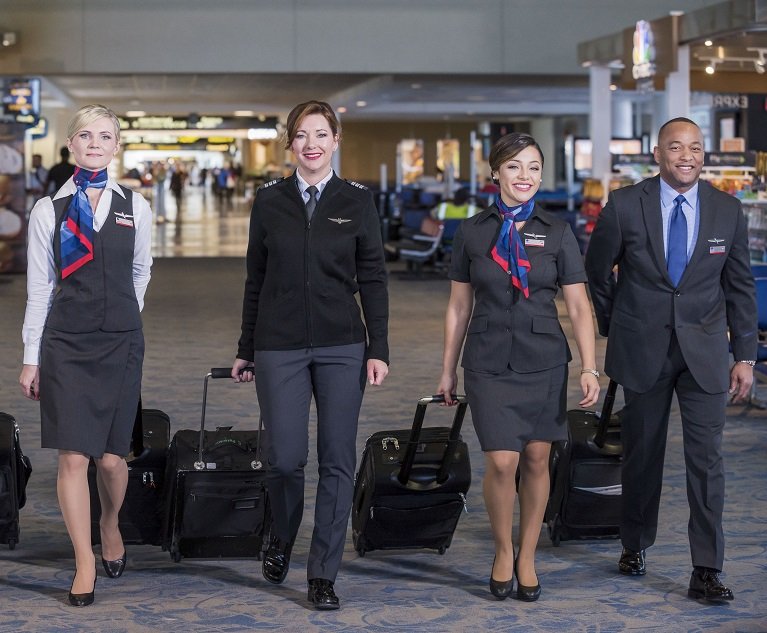How American Airlines prioritizes employee wellness
Part 1 of 3: This airline is one of three winners of 2023 Workers' Comp Risk Management Award for Excellence.

Creating and managing an exceptional workers’ compensation program is the backbone of Bryan Conner’s role as manager of workers’ compensation at American Airlines. From employee advocacy and 24/7 resource support to clinical consultations, the company’s robust program and advocacy model has helped significantly reduce medical claims and litigation, while helping keep 65% of injured team members on the job.

American Airlines is one of three winners of the 2023 Workers’ Comp Risk Management Award for Excellence, an annual recognition program organized in partnership with the Workers’ Compensation Institute and sponsored by Sedgwick and Safety National. Read about all three winners of this year’s award in the August 2023 issue of NU Property & Casualty magazine.
At its core, this program’s success is driven by the airline’s appreciation and respect for its team members. The company’s operations are expansive, specialized and demanding. What this means is that its workers’ compensation solutions need to be customized and rise to meet specific workforce needs.
“Our team members are the reason we do what we do every day,” Conner says. “[They] define us as an organization and make us who we are.”
It’s important to understand that the jobs American Airlines’ employees perform are physically demanding. The flight attendants serve thousands of passengers each day to ensure a safe and enjoyable flight. Members of the ramp crew load, unload and transport large quantities of cargo and luggage with speed and efficiency. The mechanics skillfully tear down and reassemble huge aircraft while working at heights and operating powerful tools and equipment.
“Our No. One priority is safety, and we make every attempt to prevent work-related accidents and injuries,” Conner says. “However, when one of our team members becomes injured, our commitment to their well-being doesn’t waver. We value what they do, appreciate who they are and are committed to walking the workers’ compensation journey with them.”
In Conner’s opinion, what takes the airline’s workers’ compensation program from good to exceptional is the company’s dedicated, committed and compassionate claims team.
“Our claims analyst and our support team are responsible for the daily work that supports our mission, and they deserve endless accolades and credit for the culture and expectations for which our workers’ compensation program has become known,” Conner says.
In his role as the manager of workers’ compensation at the airline, Conner recognizes that workers’ compensation can be challenging and riddled with complexities. He’s proud of the individuals on his team who walk the workers’ compensation journey with their injured colleagues.
“We have created a culture that centers on our team members’ recovery and well-being. While we recognize the need to achieve balance throughout the process, my team focuses on taking actions designed to benefit and serve our team members’ needs,” Conner says. “My team works very hard every day to simplify the process and ensure an improved experience for those have been injured as they strive to recover and resume a productive life.”
Conner, along with the rest of the workers’ compensation team embraces innovation at every opportunity. They strive for continuous improvement and that means trying new practices and approaches.
“As an example, today we live in a world where people expect instant gratification. Recognizing this societal evolution and expectation, we worked with our claims partner to create a customized solution to address this new reality. Injured team members can talk with a live human being 24 hours a day, seven days a week,” Conner says.
He explains that since team members have access to immediate information, many issues can be resolved on the spot. This reduces uncertainty and eliminates the chance for concerns to escalate over time.
“This is a great example of how we are responding to ever-changing demands and challenges while keeping our team members at the forefront of the workers’ compensation process,” Conner says.
Additionally, American Airlines recently revamped its return-to-work program. The company now offers on-site specialists who work with front-line leaders to determine what work is available and then define a limited duty assignment that adheres to any medical restrictions.
In addition to supporting front-line goals, this arrangement keeps injured team members engaged with their colleagues while allowing the collection of full benefits and pay.
The aspect of Conner’s career that he enjoys the most is serving others and utilizing servant-leadership principles to guide his decision-making process. As Conner explains, every choice he makes takes into consideration the impact on injured team members.
“What I find most meaningful in my career is the ability to make a positive difference in the lives of our team members. By prioritizing their well-being, showing empathy and actively addressing their needs, I strive to create an environment where they feel valued and supported,” Conner says.
Conner also applauds and credits his team for this success. As he explains, workers’ compensation does not have to be complicated when an organization is committed to doing the right thing for its employees, and his team understands this.
“Preference is given to value-based solutions that will advance the injured team member’s recovery or quality of life over low-cost, price-driven fixes,” Conner says. “This includes providing injured team members guidance and access to quality medical care, as well as timely information and resources that will allow them to focus on recovery and return to an active and productive lifestyle.”
Looking ahead, Conner is excited about the future of the workers’ compensation industry, particularly because of the remarkable advancements in technology that are poised to revolutionize how workers’ comp professionals assist injured workers.
“With the integration of advancing technology, we can enhance the level of support and care provided to those who have been injured on the job,” Conner says. “Additionally, predictive modeling tools hold immense potential in helping employers proactively prevent workplace injuries and effectively manage risk.”
Conner also recognizes that there are many opportunities coming in the future to further improve the workers’ compensation segment of the industry.
“While the airline industry presents its own unique challenges, many common issues related to injuries persist across different airlines. By specializing in this niche area, my team and I can develop expertise in injury prevention techniques and devise strategies to better support airline team members when they are injured,” Conner says. “By prioritizing the well-being of injured workers, supporting claims examiners and focusing on specialized areas, such as airline injury management, we can create a more compassionate and effective system that benefits all stakeholders involved.”

